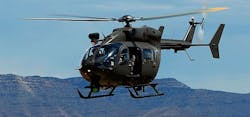Army orders 17 radio-equipped UH-72 Lakota utility helicopters from Airbus in $82.9 million deal
REDSTONE ARSENAL, Ala., 23 Oct. 2014. Airbus Helicopters Inc. in Herndon, Va. (formerly EADS North America), will build 17 UH-72 Lakota utility helicopters with airborne radios for the U.S. Army under terms of a $82.9 million contract modification announced Wednesday.
The helicopter order, from the Army Contracting Command at Redstone Arsenal, Ala., calls for Airbus Helicopters to provide the 17 UH-72A helicopters with Raytheon AN/ARC-231 Airborne Communication System radios. The Army ordered four Lakota helicopters last February for $22.9 million, and ordered 10 more Lakotas last May for $55.4 million.
The UH-72A Lakota, built in Columbus, Miss., has been designed for the U.S. Army, National Guard, and Navy for missions ranging from disaster response and border patrol to pilot training. This modification brings the total value of this Lakota contract to Airbus Helicopters to $2.66 billion, Army officials say.
Related: Army asks Norwegian company to design Black Hornet pocket UAV helicopter for foot soldiers
The UH-72 Lakota is a twin-engine helicopter with a four-bladed main rotor, and is a militarized version of the EC145 rotorcraft. The helicopter was selected as the winner of the Army's Light Utility Helicopter (LUH) program in 2006, to replace aging UH-1H/V and OH-58A/C helicopters in the Army and Army National Guard fleets.
Seating capacity of the Lakota is for two pilots and six passengers. Two stretchers can be installed for MEDEVAC missions with a crew of four: pilot, co-pilot and two medics.
The Raytheon AN/ARC-231 Skyfire multimode airborne communications system is an avionics VHF and UHF line-of-sight avionics radio and satellite communications (SATCOM) system for the UH-72 Lakota helicopter, as well as for MH-60L/M and UH-60L/M Black Hawk helicopters, AH-64 Apache helicopter gunships, the Rivet Joint surveillance aircraft, and the Joint Surveillance and Target Attack Radar System (Joint-STARS) aircraft.
The ARC-231 avionics radio operates from 30 to 512 MHz, has frequency-agile modes for electronic counter-countermeasures (ECCM), demand assigned multiple access (DAMA), integrated waveform (IW), and air traffic control (ATC) channel spacing selectable in 5, 8.33, 12.5, and 25 kHz steps.
The aircraft radio has embedded encryption, as well as SINCGARS and HAVE QUICK I and II frequency agile modes. UHF SATCOM and DAMA protocols provide beyond-line-of-sight SATCOM, with IP networking. The ARC-231 is a software definable radio with upgrades available via PC-based software downloads.
Lakota helicopters have night vision goggle-compatible glass cockpits. Its vehicle and engine management display (VEMD) increases situational awareness and reduces pilot workload.
Related: Northrop Grumman to provide flight computers for Marine Corps helicopter upgrades
The Lakota helicopter is 33.4 feet long, 11.3 feet high, and 5.7 feet wide, with a 36.1-foot main rotor. It can lift nearly 4,000 pounds, fly as fast as 145 knots at altitudes to 11,300 feet above sea level. The rotorcraft can hover safely at 9,000 feet.
On this contract Airbus Helicopters will do the work in Columbus, Miss., and should be finished by the end of January 2016. For more information contact Airbus Helicopters online at www.airbushelicopters.com, or the Army Contracting Command at Redstone Arsenal at www.acc.army.mil/contractingcenters/acc-rsa.

